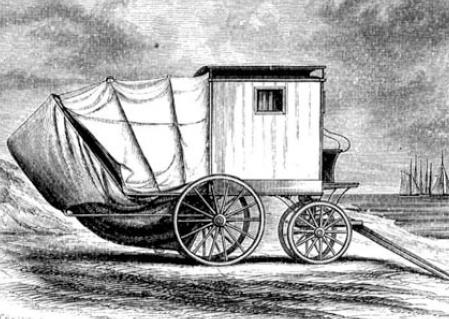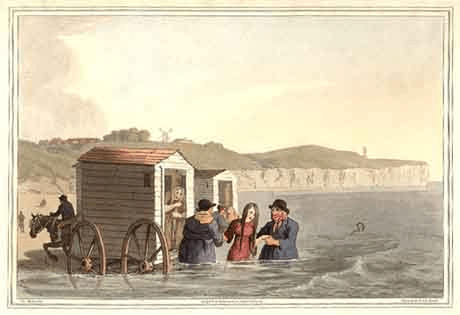A Day at the Beach—Regency style
It’s summertime here in the northern hemisphere. If you’re having hot, sunny weather where you live as well, perhaps you’ve cooled off with a visit to the beach. I’ve been spending a lot of time on the beach myself. Not in reality, but in researching a future novel set on the English seaside.

I’m guessing some of you may have watched the fairy recent miniseries, Sanditon (based on Jane Austen’s unfinished novel). And if you have, you’ve already gotten a taste of the Regency seaside.
During the 18th and 19th centuries, more people bathed in the sea for the sake of their health than for pleasure, as sea bathing was reported to be useful in curing varying ailments.
No person could be really well…without spending at least six weeks by the sea every year. The sea air and sea bathing together were nearly infallible…for every disorder of the stomach, the lungs or the blood. Nobody could catch cold by the sea; nobody wanted appetite by the sea; nobody wanted spirits; nobody wanted strength. Sea air was healing, softening, relaxing–fortifying and bracing.”
—Jane Austen, Sanditon
Seaside resorts became popular along the coasts and fashionable spa towns developed, which drew invalids and tourists alike. Often resort towns had separate beaches or bathing areas for men and women, in part because men usually swam wearing no clothing at all. (I know this might sound scandalous to some, but only 40 years ago when my husband was in school, guys swam au naturel during P.E. class!)
 Bathing machines at Sidmouth, Devon circa 1815
Bathing machines at Sidmouth, Devon circa 1815To preserve ladies’ modesty, vehicles called “bathing machines” were invented. These four-wheeled enclosed wagons had doors on either end and were like mobile dressing rooms.

Ladies would enter through one door fully dressed, take off their clothing and change into shapeless bathing costumes without being seen by those on the beach. Meanwhile, the wagon was drawn, usually by horse, into the sea. Once deep enough in the surf, the bather would exit the wagon using the door facing the water.
..the bather descending from the machine by a few steps is concealed from the public view, whereby the most refined female is enabled to enjoy the advantages of the sea with the strictest delicacy.”
—Margate Kent, 1805
Some machines even had a “modesty hood,” like a tent that could be lowered over the female bather, to shield her from prying gazes.

Since many people were inexperienced swimmers, a dipper—a strong person of the same sex—would escort the bather into sea. For a fee, the dipper would even dunk the person under the water, and eventually help them out again, exhausted and wet.

Now, doesn’t that sound like a relaxing day at the beach? 
How are you keeping cool this summer?



